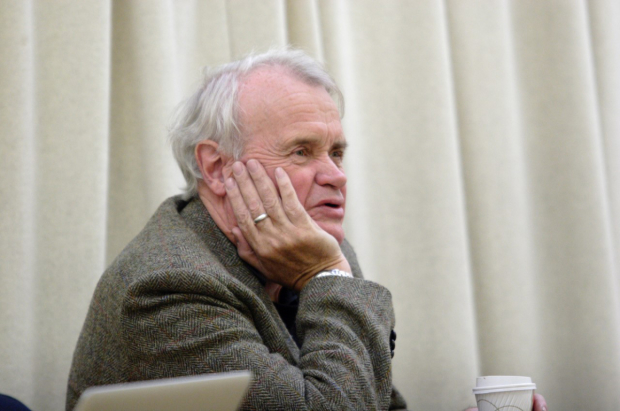Howard Brenton: 'To write Strindberg anew, I had to contact his spirit'

© Catherine Ashmore
I know it was a cheek of me to attempt to write a version of August Strindberg’s masterpiece in English, and not only because I don’t know a word of Swedish. I wanted to do something that’s impossible – to write a play so true to Strindberg that it would seem it was he, not I, who was writing Miss Julie in English.
It’s a fashion for playwrights to "bring their own worlds" to classics, which means mucking them about to make them "modern and relevant". This is an age that craves instant, twittered moral messages. But there are no easy messages in Strindberg – it’s visceral writing, deeply human but often irrational.
He’s the first great "modernist" playwright yet very close to the Greeks, particularly Euripides. A bitter humour flashes as his characters flail about, locked in a tragic end game they cannot escape. The sordid becomes magnificent. Miss Julie comes from a dark and mysterious place in the – yes, I’ll write "soul" here, rather than "mind". In his last great play, To Damascus, Strindberg came to believe in the soul.
Put a modern mask on Strindberg and you’ll muffle him
He was a troubled and troubling genius. His output was enormous – plays, autobiographies, writings on alchemy, history books, children’s books. It is wildly uneven. He had extreme love and hate relationships with just about everything and everyone – his country, his wives, his contemporaries. It is an understatement to say he was ideologically unstable – at times he was an atheist, an occultist, a socialist, an elitist, a reactionary, a progressive, a passionate advocate for, then a savage critic of, feminism.
He would stray into some very dark areas, then pull back and reclaim some kind of balance. He was prosecuted for blasphemy and denounced as one of the most dangerous men alive. And yet there are many accounts that he was a shy, beautiful and very sexy man. Put a modern mask on him and you’ll muffle him.
I didn’t read any other English translations or versions of the play or look at tapes or YouTube extracts of famous productions. I wanted to be as far as possible uncontaminated, as near as I could be to the source.
I worked solely from a literal translation by the Swedish scholar Agnes Broome. Agnes and I have worked on Strindberg before, she did the literal translation for my version of The Dance of Death, also staged by Tom Littler, the director of Theatre by the Lake’s Miss Julie. Tom, Agnes and I are Strindberg obsessives but whether we’ll ever really understand him, I doubt.
A literal translation is an attempt to record exactly what is there in the original – again, an impossibility, but that’s the intention. Sometimes there will be variant versions of difficult lines though, on the whole, Strindberg is a very direct writer. There’s no attempt at "good’" or "bad" writing; a literal is like an X-ray, it shows you what is there but not how it lives.
Genius and madness, dark and light, are so entwined in his work, you really have to keep your nerve
So what I wrote is, yes, a bold reworking, using all I could muster to make it alive. But I took nothing away nor did I add anything. I had a strict rule that all the thoughts, expressions and images must be from the original. The rule was liberating, it got me down into the engine room of a great writer’s work. I began to see the cross-currents, the strategies, his phenomenal dramatic skill and beneath the skill, the tragic vision.
I’ve done versions in the past of Jean Genet, Bertolt Brecht and Georg Buchner – it’s a way for a playwright to work out, to teach you the craft. But of all of them Strindberg is the most difficult. Genius and madness, dark and light, are so entwined in his work, you really have to keep your nerve – and not cut, not editorialise to make it more "acceptable".
Now for the cranky bit. In trying to make an "authentic" version of the play you can’t recreate its effect on its first audiences. This isn’t a museum exercise. His world no longer exists, how can we get him to write his play for ours? You have to go into a state of séance. You do all the research, read all you can that he wrote, but finally you have to start the magic. You have to contact his spirit. Writers have a secret – in a way, we can talk to the dead. It’s just what we do, you get into a kind of fug, a state of mind. We don’t like talking about it.
August, thank you. I tried not to muck you about. You encouraged me to attempt a ferocious beauty in my language. I learnt a lot from hearing your voice; I hope our audiences will too.
Miss Julie runs at Theatre by the Lake, Keswick until 3 November.










